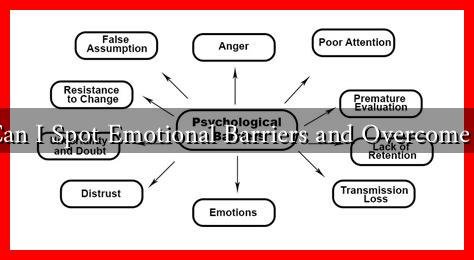-
Table of Contents
- How Can I Spot Emotional Barriers and Overcome Them?
- Understanding Emotional Barriers
- Spotting Emotional Barriers
- Strategies to Overcome Emotional Barriers
- 1. Self-Reflection
- 2. Seek Professional Help
- 3. Practice Mindfulness
- 4. Build a Support System
- 5. Challenge Negative Beliefs
- Case Study: Overcoming Emotional Barriers
- Conclusion
How Can I Spot Emotional Barriers and Overcome Them?
Emotional barriers can significantly hinder personal growth, relationships, and overall well-being. These invisible walls often stem from past experiences, fears, or negative beliefs that prevent individuals from fully engaging with life. Recognizing and overcoming these barriers is crucial for emotional health and personal development. In this article, we will explore how to identify emotional barriers and provide strategies to overcome them.
Understanding Emotional Barriers
Emotional barriers are psychological obstacles that prevent individuals from expressing their feelings, thoughts, or desires. They can manifest in various ways, including:
- Fear of Vulnerability: Many people fear being open and honest about their emotions due to the risk of rejection or judgment.
- Low Self-Esteem: Individuals with low self-worth may feel unworthy of love or success, leading to self-sabotage.
- Past Trauma: Unresolved trauma can create a defensive mindset, making it difficult to trust others or engage in new experiences.
- Negative Beliefs: Limiting beliefs about oneself or the world can create a pessimistic outlook, hindering motivation and progress.
Spotting Emotional Barriers
Identifying emotional barriers is the first step toward overcoming them. Here are some signs that you may be facing emotional obstacles:
- Consistent Anxiety: If you frequently feel anxious in social situations or when facing new challenges, it may indicate an emotional barrier.
- Avoidance Behavior: Regularly avoiding situations that trigger discomfort or fear can be a sign of emotional barriers.
- Difficulty Expressing Emotions: Struggling to articulate feelings or often feeling misunderstood can indicate underlying issues.
- Negative Self-Talk: If you find yourself engaging in harsh self-criticism, it may reflect deeper emotional barriers.
Strategies to Overcome Emotional Barriers
Once you have identified your emotional barriers, the next step is to work on overcoming them. Here are some effective strategies:
1. Self-Reflection
Take time to reflect on your thoughts and feelings. Journaling can be a powerful tool for self-discovery. Write about your experiences, fears, and emotions to gain clarity on what may be holding you back.
2. Seek Professional Help
Therapy can provide a safe space to explore emotional barriers. A mental health professional can help you understand the root causes of your barriers and develop coping strategies. Cognitive Behavioral Therapy (CBT) is particularly effective in addressing negative thought patterns.
3. Practice Mindfulness
Mindfulness techniques, such as meditation and deep breathing, can help you stay present and reduce anxiety. By focusing on the moment, you can learn to manage overwhelming emotions more effectively.
4. Build a Support System
Surround yourself with supportive friends and family who encourage open communication. Sharing your feelings with trusted individuals can help alleviate the burden of emotional barriers.
5. Challenge Negative Beliefs
Identify and challenge negative beliefs about yourself. Replace them with positive affirmations and realistic self-assessments. For example, if you believe you are unworthy of love, remind yourself of your strengths and accomplishments.
Case Study: Overcoming Emotional Barriers
Consider the case of Sarah, a 30-year-old woman who struggled with low self-esteem and fear of rejection. After years of avoiding social situations, she decided to seek therapy. Through CBT, Sarah learned to identify her negative thought patterns and challenge them. She began journaling her feelings and gradually exposed herself to social situations, starting with small gatherings. Over time, Sarah built her confidence and developed healthier relationships.
Conclusion
Emotional barriers can be challenging to navigate, but recognizing and addressing them is essential for personal growth and emotional well-being. By understanding the signs of emotional barriers and implementing strategies such as self-reflection, seeking professional help, and building a support system, individuals can break down these walls and lead more fulfilling lives. Remember, overcoming emotional barriers is a journey that requires patience and persistence, but the rewards are well worth the effort.
For more information on emotional health and overcoming barriers, consider visiting Psychology Today.

